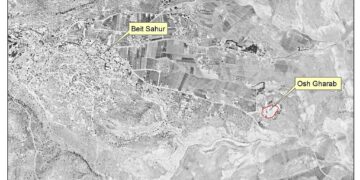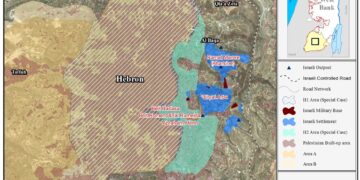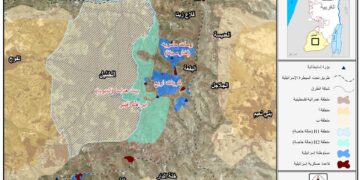Violation: construction of residential units
Location: Jalud village-Nablus governorate
Date: December 2017
Perpetrators: Israel's government
Victims: areas of Nablus suburbs
Details:
Machineries of Israel's Occupation Forces continue on ravaging and leveling works on an area of 56 dunums south Jalud village in a step to establish new residential units and roads network for Amihai colony as a replacement to the allegedly evacuated outpost Amonah.
According to field research, preparation for the construction of eight residential units and the opening of new roads were taken in the area.
The targeted lands are reported to be located within the natural block number 16 from Jalud village and number 4 from Turmus'ayya village. Noteworthy, the location is between Shevut Rahel and Adi Ad colonies. This is seen as an Israeli step to create a geographical connection between colonies to further create a colonial bloc in the area.
Photos 1-3: the new colony of Amihai
It should be noted that Israel's government approved in June the establishment of a new colony in the area and released a construction tender for that end.
About Jalud:
Jalud is located 29km to the southeast of Nablus city and is edged by Qusra village from the northeast, Qaryut village from the west, Yesh Kodish and Ahya outposts from the east and Shilo colony from the south.
Its population mounts up to 598 people (2014 census). Jalud's total land area is 22,473 dunums, of 80 dunums are considered the village's built-up area.
Israeli colonies confiscated 2227 dunums from Jalud lands. Shilo colony that was established in 1978 confiscated 640 dunums from the village. Mizpe Rahel colony and other outposts namely (Yesh Kodish, Ahya, Eli, Adi Ad and Kida) are founded on confiscated lands from the villg.
Bypass roads confiscated around 436 dunums from the village.
The lands of Marda are classified according to Oslo Accords as the following:
- 5541 dunums (25%) are classified as area B
- 16932 dunums (75%) are classified as area C
Land Research Center sees Israel continuous expansion on colonies in the West Bank and Jerusalem at the expense of Palestinians and lands a flagrant violation of Human Rights and all international laws and conventions, which prohibit disposition of public properties in occupied countries.
UN Security Council Resolution 242 of 1967: calls for
- the Withdrawal of Israel armed forces from territories occupied in the recent conflict;
- Termination of all claims or states of belligerency and respect for and acknowledgment of the sovereignty, territorial integrity and political independence of every State in the area and their right to live in peace within secure and recognized boundaries free from threats or acts of force." [4]
UN Security Council Resolution 449 of 1979: the Security Council determined:
- "that the policy and practices of Israel in establishing settlements in the Palestinian and other Arab territories occupied since 1967 have no legal validity and constitute a serious obstruction to achieving a comprehensive, just and lasting peace in the Middle East"
UN Security Council Resolution 452 of 1979: states that
- "the policy of Israel in establishing settlements in the occupied Arab territories has no legal validity and constitutes a violation of the Fourth Geneva Convention relative to the Protection of Civilian Persons in Time of War of 12 August 1949" and "calls upon the Government and people of Israel to cease, on an urgent basis, the establishment, construction and planning of settlements in the Arab territories occupied since 1967, including Jerusalem."
UN Security Council Resolution 465 of 1980:
- It expressed concern at Israeli settlement policy in the Arab territories and recalled resolutions 237 (1967), 252 (1968), 267 (1969), 271(1969) and 298 (1971). It further called upon the State and people of Israel to dismantle such settlements. The resolution calls on all states ‘not to provide Israel with any assistance to be used specifically in connection with settlements in the occupied territories’.
Prepared by
The Land Research Center
LRC















